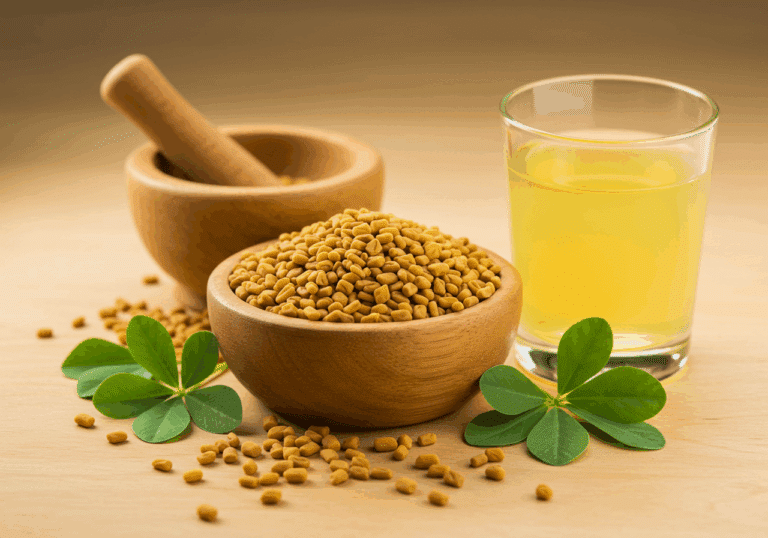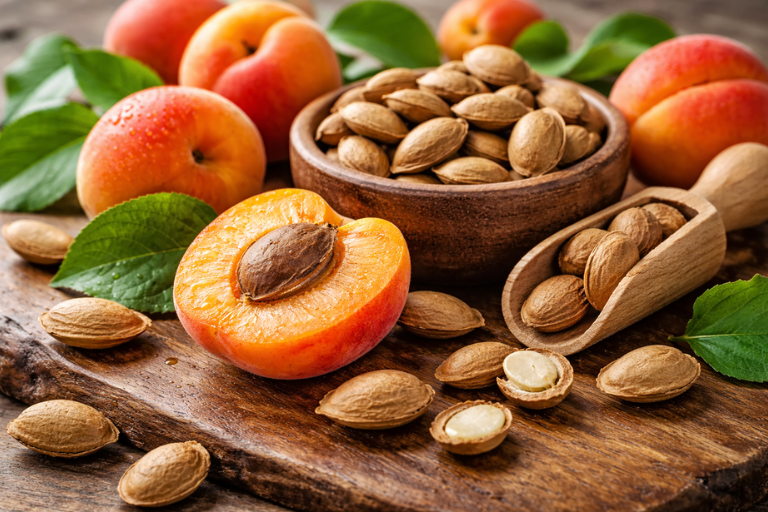9 Powerful Berberine Benefits You Need to Know

You’ve probably heard whispers about berberine’s impressive health benefits, but you might not realize just how powerful this golden compound can be for your body. From managing blood sugar levels as effectively as prescription medications to supporting weight loss and protecting your heart, berberine offers a remarkable range of therapeutic effects. What’s particularly striking is how this natural alkaloid works at the cellular level to transform multiple aspects of your health simultaneously.
Blood Sugar Control and Diabetes Management
Because managing blood sugar levels remains a critical challenge for millions of people with diabetes, berberine has emerged as a powerful natural compound that rivals conventional medications in effectiveness. You’ll see significant improvements in your HbA1c levels, with reductions of approximately 2% over three months. Your fasting blood glucose can drop by about 3.8 mmol/L, while postprandial levels decrease by roughly 8.8 mmol/L.
What sets berberine apart is its comparable effectiveness to metformin without the typical side effects. You’ll notice improvements within 5 weeks that continue throughout treatment. Unlike metformin, berberine also reduces triglycerides and total cholesterol while improving insulin sensitivity. It works by enhancing pancreatic insulin secretion, suppressing liver glucose production, and promoting more efficient glucose breakdown in your cells.
Research shows berberine can also lower HOMA-IR scores, indicating better insulin resistance management in diabetic patients. Additionally, adopting lifestyle changes such as improving diet and managing stress can complement berberine’s effects for overall metabolic health.
Enhanced Insulin Sensitivity and Glucose Transport
While managing blood sugar levels represents just one aspect of berberine’s therapeutic potential, its ability to enhance insulin sensitivity and glucose transport addresses the root mechanisms of metabolic dysfunction.
You’ll benefit from berberine’s activation of AMPK, which enhances GLUT4 translocation to cell membranes, dramatically improving glucose uptake by muscle and fat cells. This compound upregulates insulin receptor expression, making your cells more responsive to insulin’s signals.
Berberine inhibits key transcription factors like FOXO1 and PGC-1α, suppressing hepatic glucose production through reduced PEPCK and glucose-6-phosphatase enzymes. Additionally, it increases GLP-1 secretion, promoting glucose-dependent insulin release from pancreatic β-cells.
These combined mechanisms optimize your glucose transport and utilization while reducing insulin resistance markers. Clinical studies have demonstrated berberine’s effectiveness in managing type 2 diabetes, with results comparable to conventional pharmaceutical interventions.
Cardiovascular Health Protection
Your cardiovascular system benefits greatly from berberine’s dual action on cholesterol management and heart function optimization.
You’ll experience improved lipid profiles as berberine activates AMPK pathways to reduce cholesterol synthesis while inhibiting PCSK9 enzymes that remove LDL from your bloodstream.
Your heart’s electrical stability and pumping efficiency also improve through berberine’s ability to regulate cardiac rhythm and enhance coronary blood flow. Berberine also reduces apolipoprotein B levels by 13-15%, directly lowering your cardiovascular risk factor profile.
Cholesterol and Lipid Control
Although cardiovascular disease remains a leading cause of death worldwide, berberine offers promising natural support for heart health through its impressive cholesterol and lipid-lowering properties.
You’ll find that berberine can reduce your LDL cholesterol by approximately 24-30% and lower total cholesterol by 25-30%. It’s particularly effective at decreasing triglycerides by around 35%, markedly reducing your cardiovascular risk. Incorporating omega-3 fatty acids from foods like fatty fish can further enhance this cardiovascular protection.
Berberine works by upregulating LDL receptor expression, improving your body’s ability to clear harmful cholesterol from your bloodstream. It also enhances lipid metabolism and exhibits anti-inflammatory properties that support vascular function. Unlike statins, berberine operates through independent mechanisms that don’t rely on SREBPs for cholesterol regulation.
The typical effective dose ranges from 500-1,500 mg daily, divided with meals. While clinical trials show promising results, you should consult your healthcare provider before starting berberine supplementation.
Heart Function Support
Beyond its cholesterol-lowering capabilities, berberine provides extensive cardiovascular protection by directly supporting heart function and vascular health.
You’ll benefit from berberine’s ability to stabilize your heart’s electrical activity by prolonging action potential duration and effective refractory period, which helps prevent dangerous arrhythmias. Clinical studies show that 62% of patients with ventricular tachyarrhythmia experienced significant reductions in irregular heartbeats.
Berberine also enhances your blood vessel function by stimulating nitric oxide production through the AMPK pathway, promoting healthy vasodilation.
It acts as a natural calcium channel blocker, reducing vascular resistance and lowering blood pressure. Additionally, berberine protects your heart muscle from oxidative damage by activating Nrf2 signaling pathways, reducing inflammation and preventing the cardiac remodeling that leads to heart failure.
In patients with congestive heart failure, berberine treatment significantly improves left ventricular ejection fraction and reduces total mortality from 16.4% in control subjects to just 8.8% in the berberine group.
Weight Loss and Body Fat Reduction
If you’re struggling with weight management, berberine can help reduce your BMI and overall body weight when taken consistently.
Studies show you’ll likely see significant improvements in waist circumference after 24 weeks of supplementation at 1.5 grams daily.
You’ll also benefit from berberine’s natural appetite-suppressing effects, which work alongside its metabolic improvements to support your weight loss goals. The compound achieves this by increasing appetite-regulating substances like GLP-1, GLP-2, and peptide YY in your body.
Reduces BMI and Weight
Since obesity rates continue climbing worldwide, many people are turning to natural supplements like berberine for weight management support. Research shows berberine can considerably reduce your BMI when taken consistently.
A 2023 clinical study found that participants taking 1.5 grams daily for 24 weeks experienced meaningful BMI decreases alongside improved blood sugar regulation.
You’ll see these benefits because berberine activates AMPK, which increases your energy expenditure and fat oxidation. It also reduces insulin resistance, helping your body utilize glucose more efficiently while decreasing fat storage. The supplement works by enhancing insulin sensitivity, which promotes better glucose uptake into cells and supports metabolic function.
Multiple reviews from 2020 and 2022 confirm berberine’s effectiveness for long-term weight loss and obesity prevention.
However, current research involves small sample sizes and short-term studies. You should consult your healthcare provider before using berberine for weight management.
Suppresses Appetite Naturally
Berberine’s weight-loss benefits extend beyond BMI reduction through its powerful appetite-suppressing properties. This natural compound activates AMPK, your body’s energy sensor, creating a fasting-like state that reduces hunger signals.
By modulating neuropeptides like NPY in your brain, berberine directly impacts appetite control – studies show it reduced food intake by 47.5% in appetite-stimulated rats.
You’ll experience enhanced satiety as berberine slows gastric emptying, keeping food in your stomach longer and naturally suppressing hunger pangs.
It also improves insulin sensitivity and stabilizes blood glucose levels, preventing the spikes that trigger excessive hunger. Clinical evidence demonstrates that berberine promotes glucose uptake independent of insulin through GLUT4 translocation.
Through AMPK activation, berberine promotes fat breakdown while inhibiting fat synthesis, creating metabolic conditions that support reduced appetite and healthier eating patterns without forcing restrictive dieting.
Anti-Inflammatory Effects Throughout the Body
Although inflammation serves as your body’s natural defense mechanism, chronic inflammatory states can wreak havoc on multiple organ systems and contribute to serious health conditions. Berberine acts as a powerful anti-inflammatory compound that targets inflammation throughout your entire body.
You’ll benefit from berberine’s ability to suppress key inflammatory mediators like TNF-α, IL-6, and COX-2 by inhibiting the NF-κB pathway. It modulates your immune system by reducing pro-inflammatory Th1 and Th17 cells while restoring healthy immune balance.
In your digestive system, berberine protects gut barrier function and reduces colonic inflammation. Incorporating an anti-inflammatory diet rich in fruits, vegetables, and spices can complement berberine’s effects to reduce inflammation.
Your respiratory system gains protection through reduced inflammatory cell infiltration in lung tissues. Additionally, berberine decreases inflammatory cytokine production in your liver, improving hepatic function and reducing systemic inflammation associated with metabolic disorders.
For autoimmune conditions, berberine enhances Treg cell functions to promote immune tolerance and suppress autoreactive immune responses that contribute to chronic inflammation and tissue damage.
Powerful Antioxidant Properties
Your body constantly battles free radicals that damage cells and accelerate aging, but berberine’s powerful antioxidant properties can tip the scales in your favor.
This remarkable compound doesn’t just neutralize harmful molecules—it actively strengthens your cellular defense systems by boosting natural antioxidant enzymes like superoxide dismutase.
You’ll find that berberine’s protection extends throughout your body, shielding everything from your pancreatic cells to your cardiovascular system from oxidative damage. Research shows that berberine’s antioxidative properties work alongside its anti-inflammatory effects to provide comprehensive protection against vascular diseases.
Cellular Damage Protection
When your cells face constant assault from free radicals and oxidative stress, berberine acts as a powerful cellular guardian through its remarkable antioxidant properties. This natural compound doesn’t just neutralize harmful reactive oxygen species – it transforms your body’s entire defense system at the molecular level.
Berberine’s cellular protection works through three key mechanisms:
- Direct Free Radical Scavenging – It neutralizes superoxide ions, nitric oxide, and other damaging molecules before they can harm your cells.
- Antioxidant Enzyme Enhancement – It boosts your body’s natural antioxidant capacity, maintaining healthy redox balance across tissues.
- Mitochondrial Protection – It improves mitochondrial efficiency while reducing harmful ROS production in healthy cells.
These actions protect your DNA, proteins, and lipids from oxidative damage, reducing cellular aging markers like lipofuscin accumulation.
Oxidative Stress Reduction
Beyond protecting individual cells from damage, berberine tackles oxidative stress at its source by dramatically amplifying your body’s natural antioxidant machinery.
You’ll benefit from berberine’s direct scavenging of harmful superoxide free radicals while it simultaneously upregulates superoxide dismutase (SOD) production through enhanced mRNA expression. This compound activates your SIRT1 pathways, which trigger FOXO transcription factors that boost antioxidant defenses throughout your system.
Berberine’s antioxidant effects extend across multiple organs affected by oxidative damage, including your liver, kidneys, and pancreas.
You’ll experience reduced inflammatory cytokines like IL-6, as clinical studies demonstrate berberine’s ability to lower oxidative stress markers while improving your metabolic profile.
This extensive antioxidant action helps prevent complications associated with diabetes and cardiovascular disease.
Antimicrobial and Infection Fighting Capabilities
What makes berberine especially valuable is its ability to inhibit biofilm formation and enhance antibiotic effectiveness.
When you combine berberine with conventional antibiotics, it can resensitize multidrug-resistant bacteria to treatments like ciprofloxacin and meropenem.
This synergistic effect makes berberine a promising candidate for addressing difficult infections that don’t respond to standard antibiotic therapy.
Gut Microbiome Balance and Digestive Health
Berberine transforms your gut environment through three key mechanisms:
- Strengthens intestinal barrier by increasing tight junction proteins like ZO-1, reducing harmful endotoxin leakage.
- Reduces gut inflammation by decreasing T-lymphocyte infiltration and improving jejunum morphology.
- Enhances metabolic regulation by promoting SCFA production that stimulates GLP-1 release for better glucose control.
These microbiome changes create a healthier gut environment that supports both digestive function and systemic metabolic health.
Potential Neurological and Cognitive Support
Beyond its metabolic benefits, emerging research reveals that this golden alkaloid may offer significant protection for your brain and cognitive function.
Studies show berberine can dramatically improve memory and learning in Alzheimer’s disease models, with animal tests demonstrating substantial cognitive enhancements through the Morris water maze.
You’ll benefit from berberine’s multi-targeted approach to brain health. It reduces harmful amyloid plaques by decreasing amyloid precursor protein expression while fighting neuroinflammation that damages neurons.
The compound also scavenges destructive free radicals and enhances your brain’s natural antioxidant defenses.
Perhaps most importantly, berberine activates autophagy—your brain’s cellular cleanup system.
This process clears toxic protein aggregates like amyloid-beta and hyperphosphorylated tau, preventing neuronal death and maintaining healthy synaptic function for sustained cognitive performance.
Conclusion
You’ve discovered berberine’s remarkable versatility as a natural health powerhouse. From controlling blood sugar and supporting weight loss to protecting your heart and fighting inflammation, it’s clear why this compound has gained such attention. Whether you’re managing diabetes, seeking cardiovascular protection, or wanting to optimize your overall wellness, berberine offers science-backed benefits that can transform your health journey when used consistently and appropriately.
References
- https://pmc.ncbi.nlm.nih.gov/articles/PMC8107691/
- https://www.healthline.com/nutrition/berberine-powerful-supplement
- https://pmc.ncbi.nlm.nih.gov/articles/PMC8874997/
- https://www.medicalnewstoday.com/articles/325798
- https://www.mskcc.org/cancer-care/integrative-medicine/herbs/berberine
- https://pmc.ncbi.nlm.nih.gov/articles/PMC2410097/
- https://onlinelibrary.wiley.com/doi/10.1155/2021/2074610
- https://jamanetwork.com/journals/jamanetworkopen/fullarticle/2830825
- https://www.healthline.com/nutrition/berberine-diabetes
- https://pmc.ncbi.nlm.nih.gov/articles/PMC10376565/






